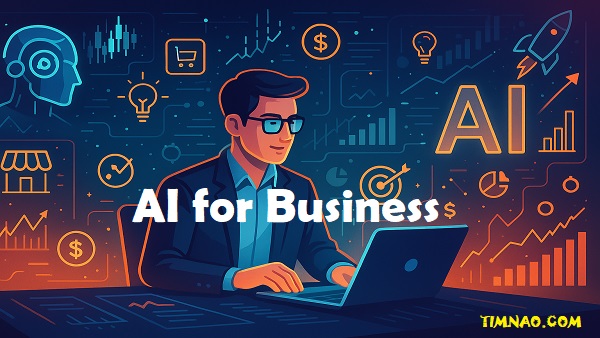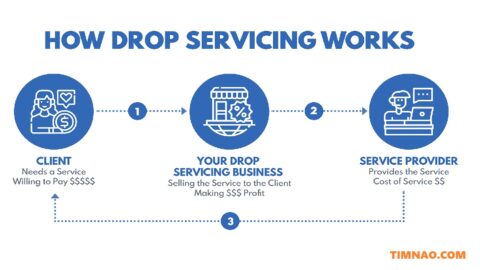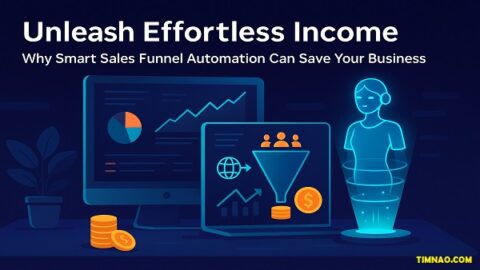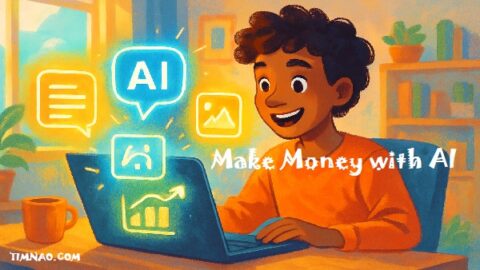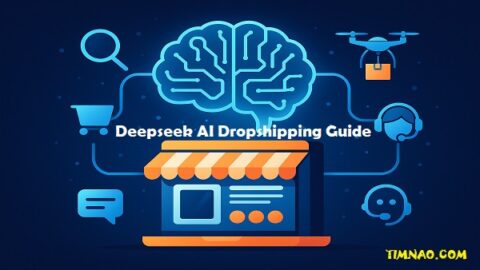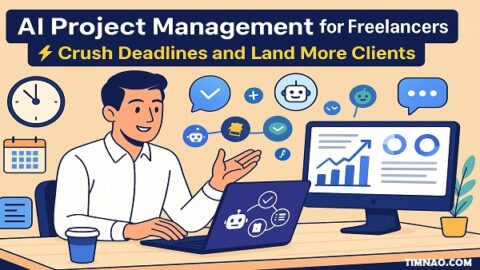The Unbelievable Advantage: Your Ultimate Guide to Launching an AI-Powered Business 🚀
The world of business is buzzing with a new, transformative force: Artificial Intelligence. For aspiring entrepreneurs, the idea of leveraging AI for business might seem like something out of a science fiction movie, reserved for tech giants in Silicon Valley. But the truth is, the power of artificial intelligence in entrepreneurship is more accessible today than ever before, offering an unbelievable advantage to those ready to embrace it.
Imagine having a partner who can analyze market trends in seconds, handle your tedious administrative tasks without complaint, and offer data-backed insights to guide your most critical decisions. This isn’t a high-priced consultant; it’s the reality of integrating AI into your venture. This guide will demystify the process, providing a clear roadmap for beginners to harness AI’s potential and pave their own path toward AI wealth creation.
Table of Contents
- 🧠 Section 1: Developing the AI Mindset: Thinking in Data
- 💡 Section 2: Finding Your Billion-Dollar Idea with an AI Co-Pilot
- 🗺️ Section 3: Building Your Unbeatable Business Plan, AI-Style
- 📣 Section 4: Reaching Your First Customers Using AI Marketing Magic
- ⚙️ Section 5: Running Your Business Smarter, Not Harder, with AI Automation
- 💰 Section 6: Mastering Your Finances and Risks with an AI Analyst
- 🚀 Section 7: Staying Ahead of the Curve with AI-Powered Innovation
- 🏁 Section 8: Your Next Steps on the AI Entrepreneurship Journey
🧠 Section 1: Developing the AI Mindset: Thinking in Data
Before diving into complex tools, the first step in using AI for business is a mental one. Successful AI-driven entrepreneurs don’t just use AI; they think like it. This means shifting your perspective from relying purely on gut feelings to embracing a data-driven mindset. In today’s economy, data is the new currency, and your ability to collect, understand, and act on it is your greatest asset.
This doesn’t mean you have to become a data scientist overnight. It simply means cultivating a habit of asking, “What does the data say?” Start small. Look at your social media analytics to see which posts get the most engagement. If you have a website, use free tools like Google Analytics to understand who is visiting and what they’re looking at.
The core of the AI mindset is objectivity. AI models don’t have feelings or biases; they operate on the information they’re given. As a human, you can’t eliminate your intuition (and you shouldn’t!), but you can balance it with hard facts. This practice helps you avoid common emotional traps, like holding onto a failing idea because you’re emotionally invested or chasing a trend without verifying if it fits your brand.
How to Think Like an AI: Data-Driven Mindset for Beginners
At the heart of AI entrepreneurship is a simple, powerful idea: data over emotion.
While humans often rely on “gut feeling,” AI makes decisions by analyzing patterns across vast pools of information — and you can too.
What does it mean to think like an AI?
-
Remove emotion from key decisions
AI doesn’t panic or get overconfident. Training yourself to assess situations based on data — not fear or excitement — leads to smarter choices. -
See data as currency
In AI-powered businesses, information is more valuable than capital. Knowing how your customers behave, what trends are emerging, and where inefficiencies lie is gold. -
Focus on patterns, not one-off events
AI looks at patterns, not anecdotes. Instead of reacting to a single customer complaint, analyze 100 reviews. Patterns reveal truth. -
Be proactive, not reactive
Using tools like predictive analytics (we’ll cover more soon), you can forecast market shifts before they happen — rather than scramble to keep up.
The mindset shift from reactive to analytical is the first leap into building an AI-empowered business.
💡 Section 2: Finding Your Billion-Dollar Idea with an AI Co-Pilot
Every great business starts with a great idea, but how do you find one in a crowded market? This is where artificial intelligence in entrepreneurship truly begins to shine. AI tools can act as your personal market analyst, scanning the digital universe to identify untapped niches and emerging trends before they become mainstream.
1. Uncovering Hidden Market Gaps
AI algorithms are masters of pattern recognition. They can sift through thousands of customer reviews, social media conversations, and search engine queries to find what people are complaining about or wishing for. These “pain points” are often the seeds of brilliant business ideas. An AI, for instance, could analyze reviews for coffee makers and find a common complaint about the difficulty of cleaning them, pointing to a market for an easy-to-clean coffee machine.
2. Putting It Into Practice: Your First AI Market Research
This might sound complex, but you can start for free. Use Google Trends to compare search interest for different ideas, like “sustainable packaging” vs. “compostable mailers,” to see where public attention is growing. You can also manually scour Reddit forums or Amazon reviews for common complaints.
For a more powerful approach, use an advanced chatbot like ChatGPT or Gemini. Give it a specific, detailed prompt:
“Act as a market research analyst. I’m interested in the home coffee brewing market. Please analyze the top 100 most recent negative reviews for the five best-selling espresso machines on Amazon. Summarize the most common complaints and identify potential opportunities for a new product.”
This directs the AI to perform targeted research that would otherwise take hours, delivering actionable insights directly to you.
3. Spotting Hidden Opportunities with AI Market Analysis
One of the most powerful uses of AI in business is analyzing markets with surgical precision.
Rather than guessing where the next opportunity lies, AI systems scan through customer behavior, industry trends, competitor moves, and even global events — to show you where to focus.
Here’s how AI helps you uncover new opportunities:
-
Sentiment analysis:
AI tools like MonkeyLearn analyze public opinion on social media, forums, and reviews — telling you how people feel about trends and products. -
Trend forecasting:
Platforms like Exploding Topics or Google Trends use AI to identify fast-growing interest areas — weeks or months before they go mainstream. -
Niche identification:
AI helps find underserved audiences based on behavior patterns. For instance, an AI model may spot that Gen Z pet owners are underserved in the wellness product niche — a great opportunity for a new brand.
Using AI-driven market analysis means no more flying blind. You know where to go, and you get there before your competitors.
🗺️ Section 3: Building Your Unbeatable Business Plan, AI-Style
With a validated idea in hand, it’s time to build your business model. Artificial intelligence in entrepreneurship can help you design a business that is not just profitable but also scalable and resilient. It’s about creating a data-informed blueprint for success from day one.
1. Choosing a Scalable Model
Scalability means your business can handle growth without its costs increasing at the same rate. AI can analyze data from various industries to suggest business models with a proven track record of scalability. For example, it might identify that subscription-based models in your niche have higher customer retention and predictable revenue streams.
Think about how companies like Netflix and Spotify use AI to personalize their subscription offerings, keeping users engaged and reducing churn. You can apply similar principles, using data to understand what would make a subscription valuable for your customers, such as exclusive content, personalized service, or convenient recurring deliveries.
2. Forecasting Demand for Strategic Growth
One of the biggest challenges for a new business is managing inventory and resources. Ordering too much leads to wasted capital, while ordering too little results in lost sales. AI-powered predictive analytics can forecast demand with surprising accuracy by analyzing historical data, seasonal trends, and even external factors like economic indicators or upcoming holidays.
This foresight allows you to make smarter decisions about everything from staffing to supply chain logistics. As your business grows, this predictive capability becomes even more crucial, enabling you to expand into new markets with confidence, knowing that your decisions are backed by data, not just hope.
3. Building Smarter Businesses with AI-Driven Models
AI isn’t just a tool — it can help you shape your entire business model.
Think of it as having a super-intelligent co-founder that’s constantly analyzing what’s working, what’s not, and how to improve.
Here are key areas where AI optimizes your business model:
-
Customer acquisition & retention
Use AI-powered platforms like HubSpot or Salesforce Einstein to analyze leads, personalize email flows, and improve customer retention. -
Product recommendations
Just like Netflix and Amazon, smaller businesses can now use tools like Clerk.io or Dynamic Yield to serve smart product suggestions that increase conversions. -
Dynamic pricing
With AI, you can adjust pricing in real time based on demand, competition, and user behavior — a strategy used by Uber, Airbnb, and major retailers. -
Workflow automation
From scheduling to inventory to customer support, AI tools like Zapier, Make, and Tidio can automate repetitive tasks, freeing you to focus on growth.
By building your business with AI from the ground up, you gain scalability, agility, and cost-efficiency that traditional models can’t match.
📣 Section 4: Reaching Your First Customers Using AI Marketing Magic
You’ve built it, but will they come? AI is revolutionizing marketing, making it possible for even the smallest startups to run highly targeted and efficient campaigns. This is where you can truly see the power of AI for business in action, turning potential customers into loyal fans.
Hyper-Personalized Marketing
Forget generic ad blasts. AI allows you to segment your audience into incredibly specific groups based on their behaviors, interests, and past interactions. You can then craft marketing messages that speak directly to their individual needs and desires, significantly boosting engagement and conversion rates.
Your AI Marketing Toolkit
For a beginner, this is easier than it sounds. You can start by using AI to generate your marketing materials. Tools like Jasper or Copy.ai can write dozens of ad headlines, social media posts, and email subject lines in minutes. AI image generators like Midjourney can create unique visuals for your campaigns, saving you the cost of a graphic designer.
Next, leverage the AI built into major ad platforms. When you run a campaign on Meta (Facebook/Instagram) Ads or Google Ads, their systems use powerful AI to find the best audience for you. Once you have some initial customers, use their “Lookalike Audience” feature. You upload your customer data, and the platform’s AI will find new users with similar characteristics, dramatically improving the efficiency of your ad spend.
⚙️ Section 5: Running Your Business Smarter, Not Harder, with AI Automation
As an entrepreneur, your most valuable resource is your time. The daily grind of administrative tasks can easily consume the hours you should be spending on strategy and innovation. AI-powered automation is the key to reclaiming your schedule and maximizing your productivity.
Automating the Repetitive Grind
Think about all the repetitive tasks you do each day: answering the same customer questions, sending follow-up emails, managing your calendar, or entering data into a spreadsheet. AI tools can handle these tasks for you with speed and accuracy, freeing you up to focus on what truly matters.
How to Automate Your Business Today
You don’t need to be a coder to start automating. Use no-code platforms like Zapier or Make to connect the apps you already use. You can create simple automated workflows, for example:
“When a customer submits my website’s contact form (Trigger), automatically create a new row in my ‘Leads’ Google Sheet (Action 1) and then send me a direct message in Slack with their details (Action 2).”
To manage your time, try an AI scheduling assistant like Clockwise or Reclaim.ai. These tools connect to your calendar and automatically find the best times for meetings, while also blocking out “Focus Time” for deep work. They intelligently shuffle your schedule as new events arise, saving you from the constant hassle of calendar management.
💰 Section 6: Mastering Your Finances and Risks with an AI Analyst
Managing finances and mitigating risks are critical for the survival and success of any new business. This is another area where AI can serve as a powerful ally, acting as your ever-vigilant financial analyst and risk manager. The goal of AI wealth creation starts with a solid, secure financial foundation.
1. Smarter Financial Forecasting
Just as AI can forecast product demand, it can also predict your financial future. By analyzing your revenue streams, expenses, and market conditions, AI models can provide more accurate financial forecasts than traditional spreadsheet methods. This allows you to create more realistic budgets and make smarter investment decisions.
This predictive power is especially crucial during economic downturns. An AI model might detect early warning signals of a market slowdown, giving you time to adjust your strategy, cut non-essential costs, and conserve cash. This proactive approach to financial management can be the difference between weathering a storm and sinking in it.
2. Detecting Fraud and Minimizing Risk
For online businesses, fraud is a constant threat. AI systems are incredibly effective at fraud detection. They can monitor transactions in real-time and flag any activity that deviates from a customer’s normal behavior. For example, a sudden large purchase from an unusual location would trigger an alert, preventing a fraudulent transaction from going through.
This same principle applies to broader business risks. AI can analyze supply chain data to predict potential disruptions or monitor competitor behavior to warn you of a new threat. By identifying risks before they escalate, you can develop contingency plans and protect your business from unforeseen challenges.
3. Making Better Financial Decisions with AI Tools
Let’s face it: money decisions are hard. Especially when emotions like fear, greed, or overconfidence get in the way.
That’s where AI becomes a financial lifesaver.
Instead of relying on hunches or gut-checks, AI tools help entrepreneurs make objective, well-informed financial decisions — by removing emotional bias and replacing it with cold, hard insight.
The AI Advantage in Financial Thinking
Here’s how AI tools are reshaping financial decision-making for startups and solopreneurs alike:
-
Bias-free budgeting
Platforms like Fyle or Truebill help businesses track expenses and recommend optimizations based on behavior — not just spreadsheets. -
Smart investment choices
Robo-advisors like Betterment or Wealthfront use AI to allocate your capital based on goals, risk appetite, and market forecasts — great for passive business investing. -
AI-powered forecasting
Financial tools like Jirav and Planful forecast cash flow, sales, and profit trajectories — and alert you early if you’re veering off track.
Emotional Resilience + Data = Business Growth
Humans are prone to cognitive biases — things like:
-
Loss aversion: Fear of losing makes us avoid good risks.
-
Confirmation bias: We seek info that validates our existing beliefs.
-
Overconfidence bias: We overestimate how much we know.
AI can’t feel — and that’s its strength. It gives you data-backed, emotion-free insights that push your financial decisions toward objectivity and long-term success.
When you combine this data-driven clarity with your personal intuition, you become unstoppable.
🚀 Section 7: Staying Ahead of the Curve with AI-Powered Innovation
The business world is in a state of constant change. The companies that thrive are those that don’t just adapt to change, but drive it. Artificial intelligence is the ultimate tool for innovation, helping you identify emerging technologies and build a culture of continuous improvement.
1. Identifying the Next Big Thing
AI algorithms can analyze patents, academic research papers, and investment trends to identify emerging technologies long before they become mainstream. This gives you a priceless opportunity to position your business at the forefront of the next wave of innovation. For example, an AI analysis might highlight a breakthrough in sustainable materials, inspiring you to create a new line of eco-friendly products.
This isn’t just about technology; AI can also predict shifts in consumer culture and societal values. By understanding what will matter to people tomorrow, you can build a brand that is not only relevant but also visionary. This foresight is what separates market leaders from market followers.
2. Predictive Analytics: Your New Secret Weapon
In the hands of an AI-savvy entrepreneur, predictive analytics is like having a crystal ball that actually works.
While traditional business owners rely on historical data or gut instinct, predictive analytics leverages artificial intelligence to forecast future trends based on current patterns. This lets you act with clarity and confidence — not just hope.
So, what is predictive analytics really?
It’s the use of AI to sift through past and present data to predict what’s likely to happen next. Think of it like weather forecasting — but for your customers, sales, inventory, and market movements.
Real-World Benefits of Predictive Analytics
Here are just a few ways predictive analytics is transforming how modern entrepreneurs work:
-
Better inventory management
Retailers use tools like Inventory Planner to forecast demand, helping them avoid understocking or overstocking. Less waste, more profit. -
Smarter product development
AI tools can analyze customer feedback, purchase behavior, and social media trends to identify what features or products your audience wants next. -
Enhanced marketing performance
Predictive analytics can identify when a lead is most likely to convert — and what message they’ll respond to. Platforms like ActiveCampaign and Marketo use this to optimize campaigns in real time. -
Churn prediction
By spotting early warning signs of customer dissatisfaction, you can take action before they leave. AI doesn’t just react — it helps you prevent problems before they start.
How to Start Using Predictive Analytics
You don’t need to be a data scientist to tap into this superpower. Here’s a simple beginner’s roadmap:
-
Collect the right data
Focus on your key business goals. Want to improve retention? Track user behavior, feedback, and cancellation reasons. -
Use beginner-friendly tools
Platforms like Pecan.ai, Zoho Analytics, and even Google Analytics 4 offer predictive tools with simple dashboards. -
Test and improve
No prediction is perfect. But over time, your AI tools learn and improve — giving you more accurate, actionable insights.
Predictive analytics won’t replace your business instincts — it will amplify them with data-driven clarity.
3. Building a Culture of Continuous Improvement
Innovation isn’t a one-time event; it’s a cultural mindset. AI can help foster this culture by creating adaptive feedback loops within your organization. By continuously analyzing data from your operations, marketing, and customer feedback, AI can provide a constant stream of insights on how to improve.
When teams are empowered with these data-driven insights, they can experiment, iterate, and innovate with confidence. The synergy of human creativity and AI’s analytical power creates a dynamic environment where the business is always learning and evolving. This is the true essence of building an AI-powered enterprise.
🏁 Section 8: Your Next Steps on the AI Entrepreneurship Journey
Embracing the principles of AI for business is a journey, not a destination. It begins with a shift in mindset—viewing data as your most valuable asset and AI as your strategic partner. From there, you can begin to integrate AI-powered tools and techniques into every facet of your entrepreneurial venture.
Start by identifying the low-hanging fruit: automate a few repetitive tasks with Zapier, use Google Trends to research your next idea, or explore the AI features in the ad platforms you already use. As you become more comfortable, you can tackle more complex challenges, from building predictive demand models to crafting deeply personalized customer experiences.
The future of artificial intelligence in entrepreneurship is incredibly bright. The companies that will define the next generation of success will be those that master the art of combining human vision with machine intelligence. By embarking on this path today, you are not just preparing for the future; you are actively building it.
1. Scaling Success: Using AI to Grow, Innovate & Compete
Once your foundation is set, it’s time to scale smart — and there’s no better growth partner than artificial intelligence.
AI can help you expand faster, operate leaner, and dominate your niche — even against bigger players.
Here’s how AI fuels explosive business growth:
-
Forecast demand before it hits
Using predictive tools, you can spot seasonal spikes, trending products, or geographic interest — and prepare your supply chain before it happens. -
Find new markets globally
AI can analyze demographics, consumer behavior, and purchasing power across regions, helping you identify high-potential expansion zones. Tools like Similarweb and SEMrush are powerful for this. -
Automate and scale operations
AI assistants like Zapier or Make can automate repetitive processes like email handling, customer support routing, or order tracking. -
Personalize at scale
With tools like Klaviyo, you can send unique messages, offers, and product suggestions — all AI-personalized — to thousands of customers, automatically. -
Optimize your team
AI helps you identify when to hire, who to promote, and how to balance workloads. Tools like Lattice use analytics to improve employee performance and retention.
Scaling with AI means you don’t just grow bigger — you grow smarter, faster, and more profitably.
2. Simple Steps to Start Today
Ready to take action? Start here:
-
Audit your current processes
Where are you relying on guesswork? Where are things slowing down? Pinpoint the weak links in your workflow. -
Choose 1 area to test AI tools
Don’t overwhelm yourself. Pick one area — like marketing automation, financial forecasting, or customer support — and explore tools designed to solve that exact problem. -
Experiment and optimize
Use beginner-friendly AI platforms (like Zapier, ChatGPT, Zoho Analytics, etc.) to start experimenting. Track your results, learn, and iterate. -
Build an AI-friendly mindset
Stay curious. Follow blogs like Towards Data Science, YouTube channels like Matt Wolfe, or newsletters like Ben’s Bites to keep up with what’s possible. -
Think big, start small, scale smart
AI isn’t an all-or-nothing game. Even tiny improvements using AI can yield big savings in time and money.
3. Key Takeaways from This Guide
-
AI entrepreneurship is about combining human creativity with machine intelligence — making your business smarter, leaner, and more scalable.
-
A data-driven mindset helps eliminate emotional bias, enabling clearer decisions based on insight rather than instinct.
-
AI market analysis uncovers profitable niches, competitor moves, and trend shifts before they hit the mainstream.
-
AI-driven business models are optimized for personalization, automation, and efficiency — giving you an edge in any industry.
-
Predictive analytics turns guesswork into strategy, helping you forecast demand, behavior, and risks with accuracy.
-
AI tools can revolutionize your financial decisions — from smarter budgeting to risk-free investing.
-
You can scale with AI faster than ever: automate tasks, personalize at scale, and expand globally with smart insights.
Reference video:

